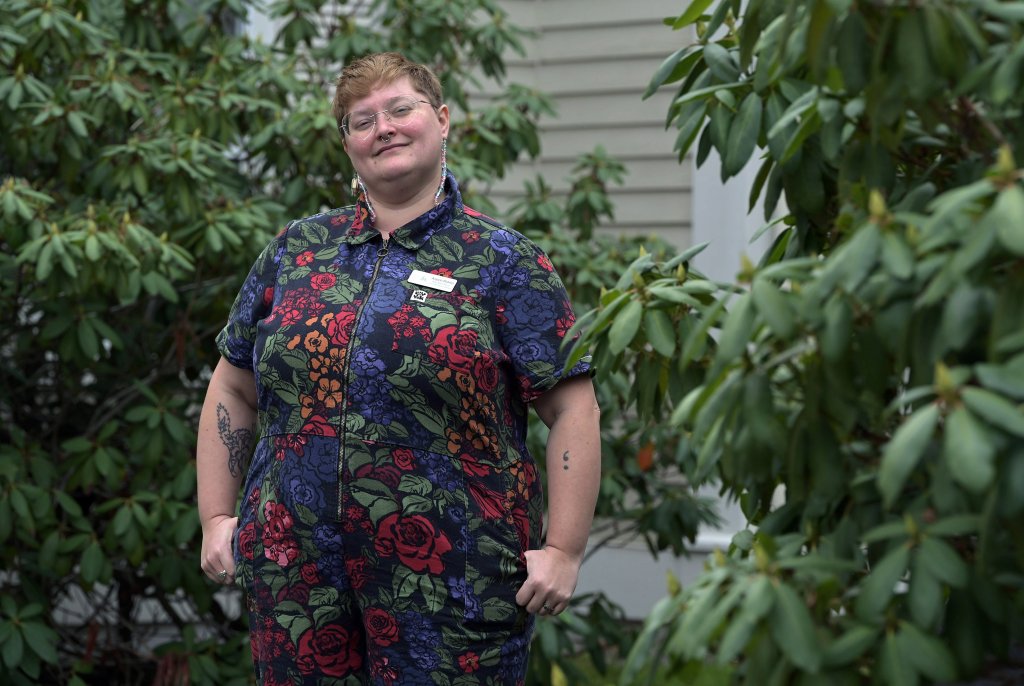Aspen Ruhlin had the same primary care provider for eight years and never came out to them as transgender.
Ruhlin, of Bangor, who uses they/them pronouns, said they didn’t have a chance to indicate their pronouns on a patient intake form. Later, when Ruhlin started treatment for cancer, they were “not able to feel comfortable or safe disclosing my identity.”
“I was put in a position where I felt obligated to be closeted,” Ruhlin said.
Ruhlin’s experience is not out of the ordinary. LGBTQ+ patients in northern Maine say it is often difficult to find a primary care physician they are comfortable with, and the problem is getting worse.

Maine Family Planning, whose three Aroostook County clinics are, according to experts, the only openly trans-friendly providers in northern Maine, stopped offering primary care in October, the result of a federal law passed this summer that restricted funds for reproductive health organizations that perform abortions.
The change left more than 150 transgender patients scrambling to find another provider they can trust with their identities and health.
“That has really hit my trans patients very hard,” said Christina Theriault, a nurse practitioner at Maine Family Planning’s clinics in Fort Kent and Presque Isle. “And I don’t have a good suggestion for them, to say: ‘Oh, I know these people are trans-friendly. You can go there.'”
Trans-friendly health care caters to the needs of transgender patients in a safe environment. Providers ask patients their preferred pronouns, are familiar with gender identity terminology and can accurately interpret lab values for people undergoing gender-affirming hormone replacement therapy.
Theriault said there are zero primary care clinics in Aroostook County that she can describe as “definitely LGBTQ-friendly.” Without that care, she said, more patients in the county will stay closeted and mask health concerns that could give rise to bigger problems down the road.

‘VERY PRIVATE’
Maine Family Planning operates 18 clinics across the state. The organization has not been able to bill Medicaid since this summer, following the passage of the One Big Beautiful Bill in July. Officials said they cut primary care to preserve access to specialized health services.
More than half of all visits to the Presque Isle and Houlton clinics were primary care appointments. Now, former patients must navigate a rural primary care network that is already burdened by financial struggles.
Ten years ago, Theriault sent a survey to other primary care clinics in the county, asking whether Maine Family Planning could include them on a list of trans-friendly providers. None responded.
Some providers have told her there are no transgender people in Aroostook County, a sprawling 6,800-plus acres of forest and potato fields that is home to just 5% of Maine’s residents, according to recent census data. But of Maine Family Planning’s 910 patients who receive gender-affirming care, nearly 20% live in Aroostook County.
Maine Family Planning is Aroostook County’s only option for hormone replacement therapy, a medical treatment that provides hormones that can help align a person’s physical traits with their gender identity. Theriault manages hormones for 159 patients between Fort Kent and Presque Isle.
“I can manage all their hormones, but I am not primary care,” Theriault said. “It needs to be somebody who is familiar with gender-affirming hormone therapy and understands what will need to be monitored.”
A primary care provider might flag a patient’s blood work as abnormal if they are only looking at hormone reference ranges for the patient’s assigned gender, not their affirmed gender on hormone therapy, Theriault said. That provider could also miss worrying side effects: high cholesterol levels for patients on estrogen, or increased red blood cell counts for those on testosterone.

The same goes for intersex people, who don’t fit into the biological binary of male or female. Jovi, a 23-year-old student who lives part time in Presque Isle and didn’t want her full name used to protect her privacy, drives to her family doctor in southern Maine for intersex hormone therapy.
In northern Maine, people stare when she wears black lipstick, Jovi said. Health care providers have never mentioned the intersex marker on her chart.
“I don’t think it’s necessarily that care providers would deny that care,” she said. “I just know that the culture up there all around is very private.”
DISCRIMINATION IN HEALTH CARE
While hormone replacement therapy is commonly associated with transgender people, most recipients are cisgender. A woman who receives hormone replacement therapy to manage menopause symptoms is no different than someone who is transitioning, Ruhlin said.
Ruhlin works in community engagement at Mabel Wadsworth Center, a feminist sexual and reproductive health practice in Bangor and the northernmost hormone replacement therapy provider in Maine outside of Theriault. The practice sees 600 patients for gender-affirming care — a total that has gone up each year, Ruhlin said.
There are 2.8 million people 13 years and older in the United States who identify as transgender, according to the Williams Institute, a think tank at the University of California.
A 2022 study comparing health outcomes for transgender and cisgender adults found transgender adults had significantly higher odds of adverse health outcomes, including poor physical and mental health, as well as higher rates of chronic conditions and disability.
Some of those health risks stem from provider misinformation. Ruhlin knows patients who have been denied pap smears or pelvic exams by providers who do not understand transgender people’s health needs, or are outright discriminatory.
“There’s often the assumption that when a marginalized group experiences health disparity, it is because of something inherent to that marginalized group, but that is not the case,” Ruhlin said. “It is a combination of the stresses of experiencing discrimination generally, and experiencing discrimination from health care providers specifically.”
Transgender competency trainings are available for health care providers seeking to better understand transgender health needs. Theriault said primary care providers can also be trained in managing hormones.
She hopes one day she won’t be the only provider of gender-affirming care in Aroostook County.
Transgender people from the county report similar feelings of isolation. From the moment they step in Mabel Wadsworth’s office, Ruhlin tries to reassure them they are not alone.
“I’ve had so many people who were like: ‘Oh my God, I feel like I’m the only person in Aroostook County who is trans,'” Ruhlin said. “And it’s like, I can’t say anything without violating HIPAA: ‘You’re not even the first one I’ve talked to today.'”
“Trans folks are everywhere,” Ruhlin added. “We have always been everywhere.”

